- Home
- Parnell Hall
11-Trial
11-Trial Read online
Praise for Parnell Hall’s mystery TRIAL
“Hilarious... Mr. Hall delights in applying the classic style of high comedy to base genre material, so he can get away with the wordplay, or any other game that takes his fancy.”
—Marilyn Stasio, New York Times Book Review
“Hall develops his usual complex plot and dialogue-driven narrative, highly recommended to fans of writers like Gregory Mcdonald, Ed McBain, and (of course) Erle Stanley Gardner.”
—Jon L. Breen, Ellery Queen Mystery Magazine
“Hall is a born yarn spinner. Erle Stanley Gardner would be proud. And maybe just a tad jealous.”
—Dick Lochte, L.A. Times
“Reminiscent of Agatha Christie in her more ingenious mode.”
—Elaine Budd,Hartford Courant
“This latest outing moves at a smart clip and nicely balances the convolutions of the alibi with a lot of very sharp turns in the courtroom.”
—Publishers Weekly
“Stanley, helped out by his redoubtable wife, Alice, brings down the courthouse with a memorable... climactic scene. Longtime fans of this rollicking series will be glad to know that Stanley talks Richard into giving him a hefty raise, which he earns every penny of.”
—Kirkus
“... includes an ingenious clue... Author Hall provides lots of fun.”
—Booklist
TRIAL
Parnell Hall
Copyright © 1996, 2010 by Parnell Hall
Published by Parnell Hall, eBook edition, 2010.
Published in paperback by Mysterious Press, Warner Books, Inc., 1997.
ISBN: 0446403962
Originally published in hardcover by Mysterious Press, Warner Books, Inc., 1996.
ISBN: 0-89296-570-3
All rights reserved. No part of this book may be reproduced in whole or in part without written permission from the author, except by reviewers who may quote brief excerpts in connection with a review in a newspaper, magazine, or electronic publication; nor may any part of this book be reproduced or transmitted in any form or by any means, electronic or mechanical, without permission in writing from the author.
ISBN (Kindle): 978-1-936441-08-2
ISBN (ePub): 978-1-936441-09-9
Cover design by Michael Fusco Design | michaelfuscodesign.com
For Jim and Franny
Table of Contents
Chapter 1
Chapter 2
Chapter 3
Chapter 4
Chapter 5
Chapter 6
Chapter 7
Chapter 8
Chapter 9
Chapter 10
Chapter 11
Chapter 12
Chapter 13
Chapter 14
Chapter 15
Chapter 16
Chapter 17
Chapter 18
Chapter 19
Chapter 20
Chapter 21
Chapter 22
Chapter 23
Chapter 24
Chapter 25
Chapter 26
Chapter 27
Chapter 28
Chapter 29
Chapter 30
Chapter 31
Chapter 32
Chapter 33
Chapter 34
Chapter 35
Chapter 36
Chapter 37
Chapter 38
Chapter 39
Chapter 40
Chapter 41
Chapter 42
Chapter 43
Chapter 44
Chapter 45
Chapter 46
Chapter 47
Chapter 48
Chapter 49
Chapter 50
Chapter 51
Chapter 52
1
“I DIDN’T DO IT.”
That was a surprise. The man was one of Richard Rosenberg’s clients, and Richard Rosenberg’s clients always did it. That’s because Richard Rosenberg was one of New York City’s top negligence lawyers, and the it that his clients always did was injure themselves, usually by tripping on a crack in the sidewalk and falling down. Which, in Richard Rosenberg’s humble opinion, entitled them to sue the city of New York for a zillion dollars. So if Mr. Anson Carbinder hadn’t done it, what was I doing there?
I frowned, and noticed for the first time that Anson Carbinder was not wearing a cast. Which was also a surprise. Richard Rosenberg’s clients always wore casts. No injury, no case. Without a cast, it was hard to recognize the guy as a client. But he must be; otherwise, why would Richard have had the switchboard beep me and send me over?
I’d been beeped, called in, and either Wendy or Janet, one of Richard Rosenberg’s two switchboard girls, who happened to have identical voices, had given me the case.
It occurred to me now, Wendy/Janet had not mentioned the client’s injury. At the time, I hadn’t thought anything of it. Aside from a voice, Wendy and Janet shared an uncanny inaccuracy, so leaving out an important bit of information was par for the course. With them, I figured if I could get the address or phone number right, I could at least find the client and get the rest of the information from him.
I know, I know. This is a long and rambling explanation. Particularly since all I’m leading up to, all I’m trying to explain, is that when Anson Carbinder told me he didn’t do it, all I could think of to say was “Oh.”
Which wasn’t the right response.
He grimaced. “I know, I know,” he said. “That’s what they all say. But that’s the fact. I swear. I didn’t do it.”
My turn to frown.
Anson Carbinder was a prosperous-looking man of about thirty, with bright red hair, thinning and receding from the ever-increasing forehead of a slightly pudgy face. His portly figure was disguised by a custom-tailored suit that probably cost more than the book value of my car. Granted it was ten years old—still, Toyotas hold up remarkably well.
But I digress.
Again.
To recap the conversation, so far it had gone, “I didn’t do it.” “Oh.” “I know, I know. That’s what they all say. But that’s a fact. I swear. I didn’t do it.”
If I had been called upon to evaluate the situation at that moment, my best guess would have been that Anson Carbinder had been involved in a two-car accident and sustained a whiplash injury, which for some reason did not require a neck brace, and was attempting to establish the fact that the accident had not been his fault.
Remind me never to get a job as a prognosticator.
“So,” I said, “what exactly is it that you didn’t do?”
He frowned at me. “What are you, a comedian?”
“No, I—”
“This is a hell of a time for that.”
“For what? I mean—”
“You want to make allowances for the fact I’m upset?”
“I can see you’re upset.”
“So don’t kid around.”
I put up my hands. “Whoa. Time out. Flag on the play.”
He looked at me. “What?”
“This is one of those irritating situations where, if I read it in a book, I’d throw the damn thing across the room.”
“What are you talking about?”
“We’re talking at cross purposes.” I shrugged my shoulders. “I have been told nothing. I have no idea why I’m here. I am not rude, just ignorant. Now, you wanna take offense, or you wanna fill me in?”
He looked at me in amazement. “You mean they didn’t tell you?”
“Exactly. So please. You tell me. What is it you didn’t do?”
He looked at me. Sighed. A huge sigh, that rippled the custom-tailored contours of the three-piece suit.
“Kill my wife.”
2
I BLINKED.
“I beg your pardon?”
“I swear I didn’t do it.”
“I’m sure you didn’t. Ah, Mr....?”
“Carbinder.”
“Yes. Mr. Carbinder. You’ll pardon me, but did you just say you didn’t kill your wife?”
“I swear to god. Now, look. Richard said you’d help me.”
“Richard did?”
“Yes.”
“You know Richard?”
“Of course I do.”
“Then you didn’t call in response to the ad?”
“Ad?”
“The TV ad. For Rosenberg and Stone.”
“Are you kidding? I called Richard. He told me he’d send you.”
“Me?”
“Yeah, you. At least, I assume it’s you. What’s your name again?”
“Stanley Hastings.”
“Yeah. That’s what he said. Hastings. He had to be in court, but he’d send the detective.”
“Oh,” I said. “That explains it.”
“What?”
“Why I got no information. Richard’s switchboard girls have the I.Q. of a turnip. If he had to be in court, the only message he’d trust them with would be to send me here.”
Anson Carbinder put up his hands. “Fine. Great,” he said. “I’m so glad you got that figured out. But, if you don’t mind, I happen to have a small problem.”
“I’m sorry. Of course you do. Please. Tell me about it.”
“Okay.” Carbinder took a breath. He held it a few moments, then exhaled noisily. It was like watching a deflating plastic blow-up toy. He looked at me helplessly. “I don’t know where to begin.”
“Start with when this happened.”
“Last night.”
“Can you be more precise?”
He gave me a look.
“Sorry,” I said. “I’m just trying to understand. You say this happened last night. What time last night?”
“I don’t know. I wasn’t there. I just got home and there she was.”
“What time did you get home?”
“I don’t know. Around two.”
“Two in the morning?”
“Yeah.”
“You came home at 2:00 A.M. and found your wife dead?”
“That’s right.”
“How was she killed?”
“With a knife.”
“A knife?”
“Yes.”
“What kind of knife?”
“A kitchen knife.”
“From your kitchen?”
“I think so.”
“You’re not sure?”
“No. I suppose it’s from the kitchen. But I don’t do the cooking. So...” he shrugged helplessly.
“Anyway, she’d been stabbed with the knife?”
“Yes.”
“Was the knife in the body?”
He shuddered. “Body.”
“I’m sorry,” I said, “but I have to ask these questions.”
“No. The knife was on the floor.”
“And where was she?”
“On the bed.”
“You came home, found your wife in bed stabbed to death and a knife lying there on the floor?”
“That’s right.”
“Next to the bed?”
“Yes.”
“Did you see it at first?”
“I beg your pardon?”
“When you walked in—did you see the knife? Did you know she’d been stabbed?”
He shook his head. “No. The lights were out. I had no idea.”
“You mean...?”
“Yeah. That’s right. I took off my clothes, slipped into bed. And then...” He shuddered again. “It was awful. Like that scene in The Godfather. You know, with the horse’s head?”
“Yeah.”
“I felt something sticky. And... strange. I didn’t know what happened. I sat up. I switched on the light.” He shook his head. “Jesus Christ.”
“Take it easy,” I said. “But get a grip and tell me what you saw.”
“Yeah, yeah,” he said. “Easy to say. Well, there was blood everywhere. Everywhere. She’d been stabbed several times. And her throat had been slit from ear to ear.”
I’d been steeling myself for it, but I shuddered nonetheless. “And what did you do?”
“I called the cops.”
“Right away?”
“Yes, of course, right away. What else would I do?”
“I don’t know. Like maybe try to see if she was still alive.”
“There was no chance. No chance. I guess I did, really. But...” He shook his head. “There was nothing to be done.”
“So you got blood on you?”
“Oh, sure.”
“And the cops found you like that?”
He nodded. “That’s it. That’s it, exactly. They came, they saw me, blood on my hands.”
“They arrested you?”
“That’s debatable. They took me in for questioning. Then Richard showed up and they let me go.”
I could imagine that. Next to money, there’s nothing Richard Rosenberg loves more than bopping cops around. If the whole thing weren’t so grisly, that thought might have amused me.
“You called Richard?”
“Absolutely. I’m no dope. I knew what it looked like. I needed a lawyer.”
“You called Richard Rosenberg at two in the morning?”
“That’s right.”
“How did you get him?”
“I called him at home.”
“You called him at home?”
“Sure. I wasn’t going to spend the night in jail.”
“You have his home number?”
“Of course.”
Of course, indeed. I’d worked for Richard Rosenberg for years, he’d acted as my attorney several times, and I didn’t have his home number. As a result of which I had once spent the night in jail.
But I wasn’t about to point that out to Anson Carbinder. As the man said, he had his own problems.
“You called Richard at two in the morning, he came and got you out of jail?”
“Not jail. The police station.”
“You weren’t charged with anything?”
“No.”
“You weren’t arraigned? Taken before a judge?”
“No.”
“Good for Richard.”
Carbinder nodded. “Yeah. He was something else. Anyway, he sent me you.” Carbinder looked at me somewhat dubiously. “I suppose there must be a reason.”
I took a breath. “Did Richard tell you to cooperate with me fully?”
“Not specifically. He just said he couldn’t be there, so he’d send someone to help.”
“Fine. So those are my instructions. Since I wasn’t given any other. I was sent here to help. So tell me everything I need to know.”
“Like what?”
“Okay. Time of death. Do the cops know when she was killed?”
“If they do, they didn’t let on.”
“They didn’t ask you where you were between the hours of such and such?”
“Oh, sure. They asked me where I was all night.”
“Where were you?”
“At a poker game.”
“A poker game?”
“Yeah.”
“Until when?”
“Until then.”
“When is then?”
“Two in the morning. I played until two in the morning, came home, and found her dead.”
“When did the game start?”
“Huh?”
“The poker game. When did it start?”
“Oh. Early. Right after dinner. Eight o’clock.”
“After dinner?”
“Yeah.”
“You have dinner with your wife?”
“No.”
“You didn’t?”
“No.”
“Who’d you have dinner with?”
“Actually, I ate alone.”
“Oh
?”
“I was working late. I had the game to go to. I just went out and grabbed a sandwich.”
“Where?”
“What?”
“Where’d you eat?”
“Oh. It’s a deli. Near the office.”
“The office?”
“Yeah. I was working late. Like I say. I ran out, grabbed a sandwich, went to the game.”
“So you never went home at all last night?”
“That’s right.”
“You call your wife?”
“Huh?”
“Speak to her on the phone?”
“Oh, sure. I called her, said I had to work late.”
“How’d she like that?”
“Fine. She was going out to the movies.”
“Oh?”
“Well, why not? I was playing poker. She knew I’d be late.”
“How long you been married?”
“Seven years.”
“You and your wife have a close relationship?”
“Of course.”
“But yesterday you didn’t see her at all? From the time you left for work in the morning—that’s the last time you saw her alive?”
“That’s right.”
“And yesterday after work you went to a poker game, played till two in the morning?”
“That’s right.”
“How many people in the game?”
“Six.”
“Including you?”
He thought a moment. “No. I made seven.”
I nodded.
That was good news. At first I thought Richard had handed me a hot potato. Stuck me with a guy who in all likelihood had killed his wife. Evidently not. Not with six independent witnesses who could give the guy an alibi for the six-hour time span during which the woman surely must have been killed.
So this wasn’t a particularly difficult or demanding job. It was, in fact, a rather routine and boring one, that of interviewing and taking witness statements from half-a-dozen poker players. Which, I was sure, was all Richard expected of me. I wouldn’t even have to see the crime scene.
I winced at that rather unsettling thought.
And another thought occurred to me.
“Excuse me,” I said.
He looked at me. “Yes?”
“Why are you here?”
“I beg your pardon?”
“I can understand the cops letting you go, with Richard putting the pressure on and all. But I’m surprised they released the crime scene so soon.”
“Oh. They didn’t.”
“I beg your pardon.”
“They didn’t release it. It’s still locked up.”
“Wait a minute. The crime scene’s your bedroom?”

 Clicker Training
Clicker Training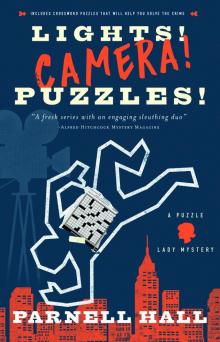 Lights! Camera! Puzzles!
Lights! Camera! Puzzles!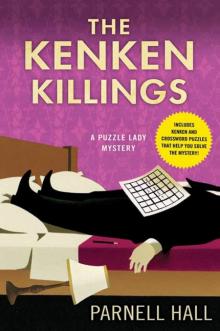 The KenKen Killings
The KenKen Killings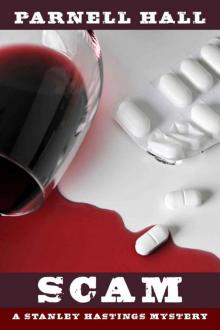 12-Scam
12-Scam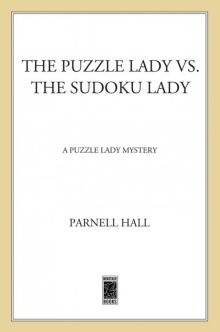 The Puzzle Lady vs. the Sudoku Lady
The Puzzle Lady vs. the Sudoku Lady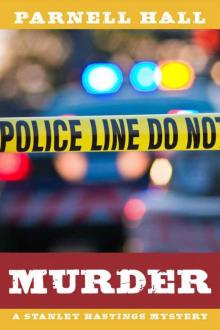 2 Murder
2 Murder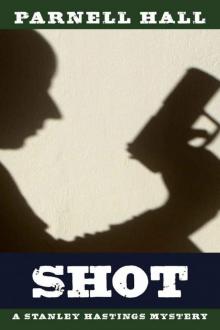 7 Shot
7 Shot You Have the Right to Remain Puzzled
You Have the Right to Remain Puzzled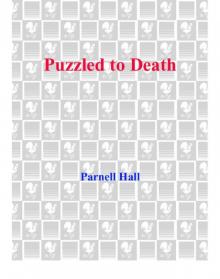 Puzzled to Death
Puzzled to Death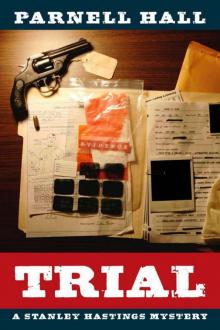 11-Trial
11-Trial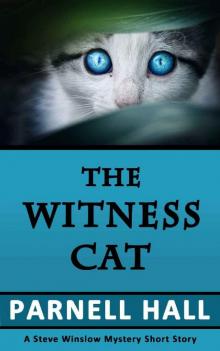 The Witness Cat (Steve Winslow Mystery)
The Witness Cat (Steve Winslow Mystery) With This Puzzle, I Thee Kill
With This Puzzle, I Thee Kill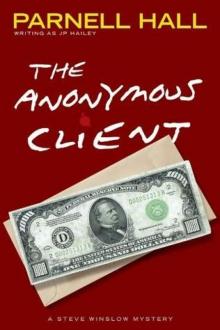 The Anonymous Client sw-2
The Anonymous Client sw-2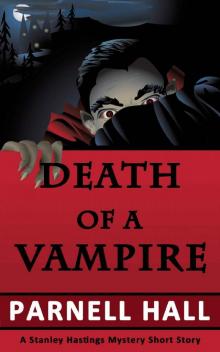 Death of a Vampire (Stanley Hastings Mystery, A Short Story)
Death of a Vampire (Stanley Hastings Mystery, A Short Story)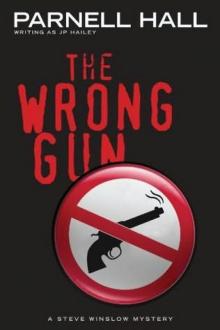 The Wrong Gun sw-5
The Wrong Gun sw-5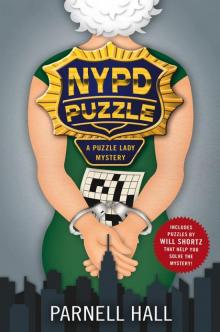 NYPD Puzzle
NYPD Puzzle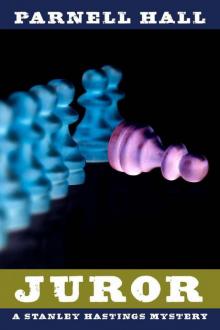 6 Juror
6 Juror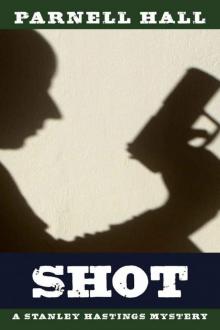 07-Shot
07-Shot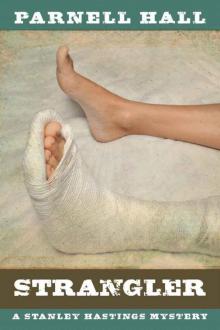 04-Strangler
04-Strangler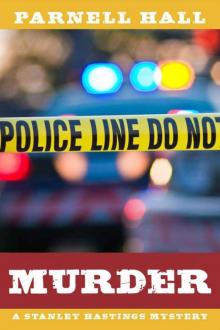 02-Murder
02-Murder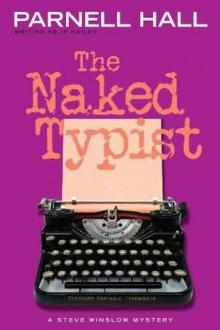 SW04 - The Naked Typist
SW04 - The Naked Typist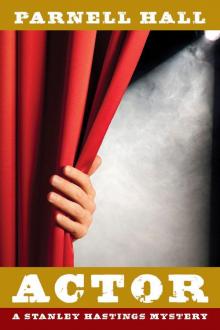 Actor
Actor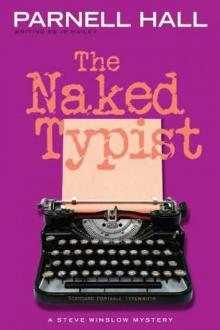 The Naked Typist sw-4
The Naked Typist sw-4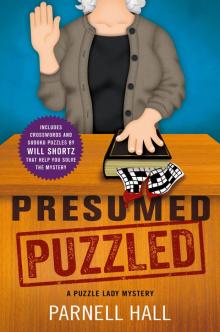 Presumed Puzzled
Presumed Puzzled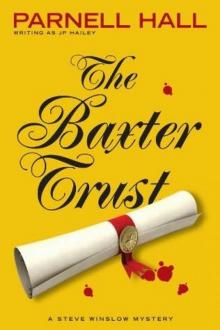 SW01 - The Baxter Trust
SW01 - The Baxter Trust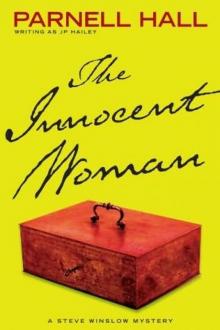 SW06 - The Innocent Woman
SW06 - The Innocent Woman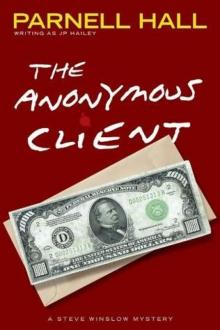 SW02 - The Anonymous Client
SW02 - The Anonymous Client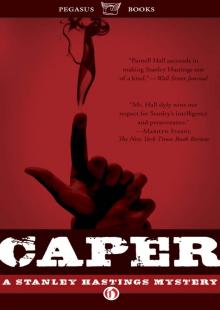 Caper
Caper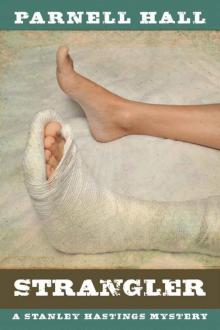 4 Strangler
4 Strangler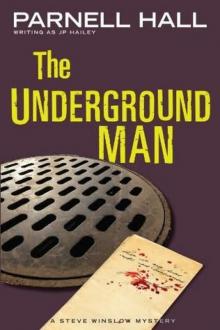 The Underground Man sw-3
The Underground Man sw-3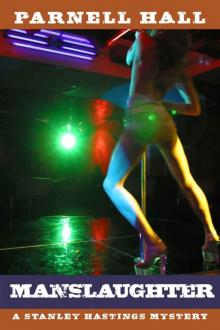 Manslaughter (Stanley Hastings Mystery, #15)
Manslaughter (Stanley Hastings Mystery, #15)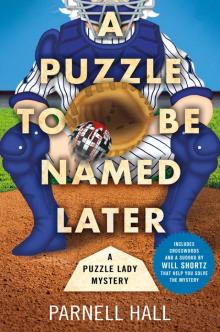 A Puzzle to Be Named Later--A Puzzle Lady Mystery
A Puzzle to Be Named Later--A Puzzle Lady Mystery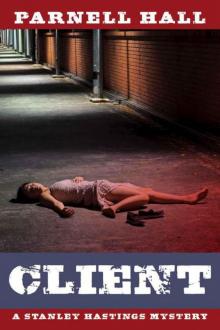 05-Client
05-Client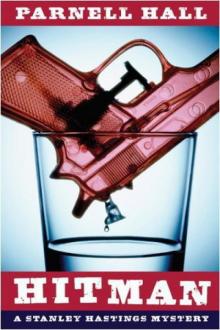 16 Hitman
16 Hitman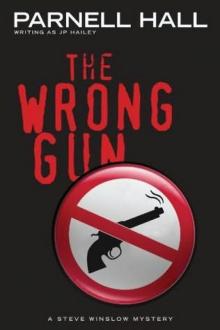 SW05 - The Wrong Gun
SW05 - The Wrong Gun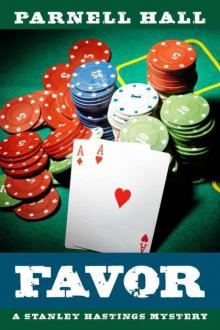 3 Favor
3 Favor Last Puzzle & Testament
Last Puzzle & Testament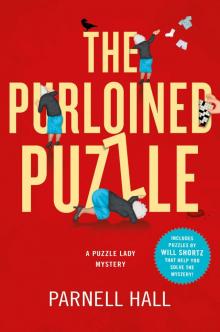 The Purloined Puzzle
The Purloined Puzzle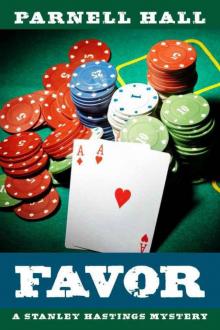 03-Favor
03-Favor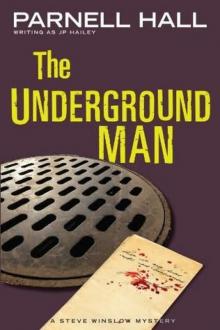 SW03 -The Underground Man
SW03 -The Underground Man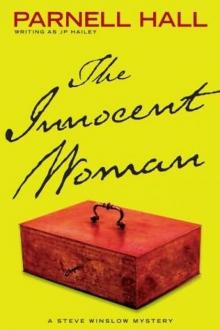 The Innocent Woman sw-6
The Innocent Woman sw-6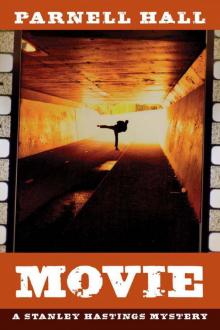 10 Movie
10 Movie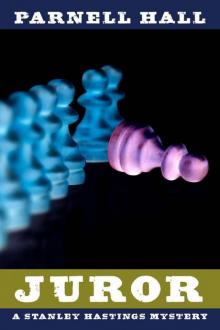 06-Juror
06-Juror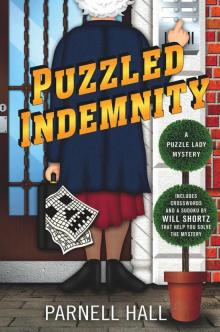 Puzzled Indemnity
Puzzled Indemnity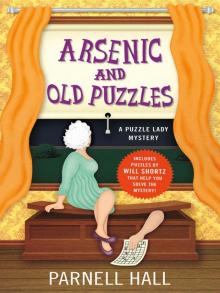 Arsenic and Old Puzzles
Arsenic and Old Puzzles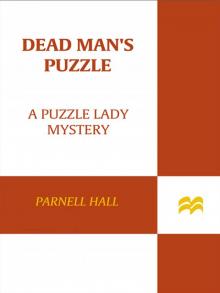 Dead Man's Puzzle
Dead Man's Puzzle Safari
Safari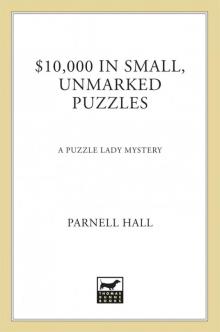 $10,000 in Small, Unmarked Puzzles
$10,000 in Small, Unmarked Puzzles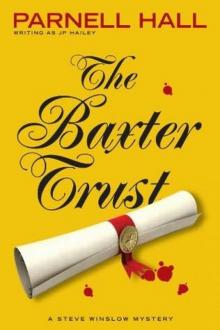 The Baxter Trust sw-1
The Baxter Trust sw-1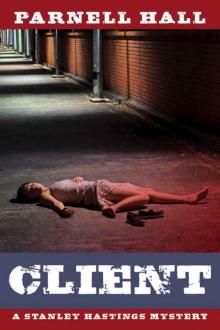 5 Client
5 Client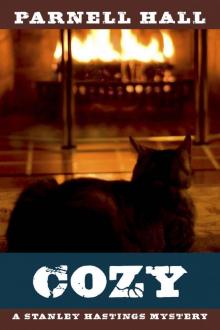 Cozy (Stanley Hastings Mystery, #14)
Cozy (Stanley Hastings Mystery, #14)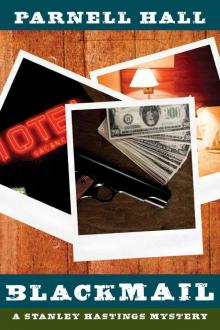 Blackmail
Blackmail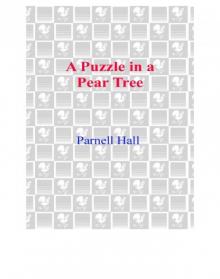 A Puzzle in a Pear Tree
A Puzzle in a Pear Tree A Clue for the Puzzle Lady
A Clue for the Puzzle Lady Clicker Training (Stanley Hastings Mystery, A Short Story)
Clicker Training (Stanley Hastings Mystery, A Short Story)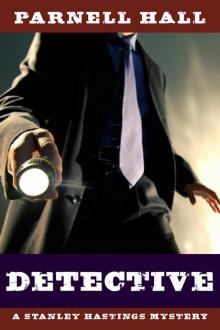 Detective (Stanley Hastings Mystery Book 1)
Detective (Stanley Hastings Mystery Book 1)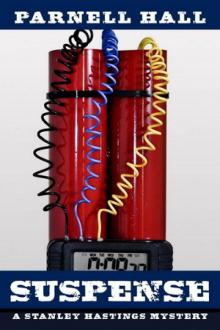 13 Suspense
13 Suspense